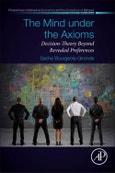The Mind under the Axioms reviews two basic ingredients of our understanding of human decisions - conative aspects (preferences) and cognitive aspects (beliefs). These ingredients are axiomatized in modern decision theory in the view to obtain a formally and empirically tractable representation of the decision-maker. The main issue developed in this book is the connection between realistic and testable psychological features and the descriptive component of abstract axioms of rationality. It addresses three main topics for which the interaction between axiomatization and psychology leads to potential new developments in experimental decision-theory and puts strictures on the standard revealed preference methodology prevailing in that field. The possibility of a cardinal representation of preferences is discussed. Different ways of accounting for incomplete preferences, and in which sense, are analysed. Finally, the conditions of separability between preferences and beliefs, such as prescribed by axioms of state-independence, are submitted to actual and potential tests. The book offers a bridge between the disciplines of decision-theory, psychology, and neuroeconomics. It is thus relevant for those, in psychology and cognitive sciences, who are sometimes put off by the high degree of formalism and abstraction in decision-theory, that seems to lie beyond the reach of psychological realism. It also aims to convince those in decision-theory for whom psychological realism and empirical testability should not constrain the modelling enterprise that conceptual clarification can come from attempted experimentation.
Please Note: This is an On Demand product, delivery may take up to 11 working days after payment has been received.
Table of Contents
1. Cardinalism 2. Incompleteness 3. State-dependence 4. A Conclusive Remark: Decision Theory and the Transistion from the Unconscious to the Conscious








